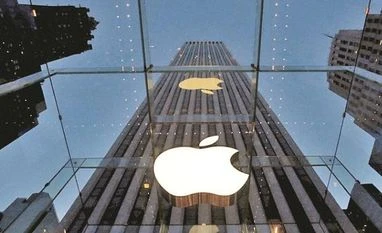At nearly $940 billion, Apple is certainly well on the way to becoming the world's first trillion dollar company — and the feat could be achieved as early as the end of this year with upcoming iPhone launches.
The tech giant crossed the $900 billion market capitalisation mark in November last year following the launch of its "super premium" iPhone X and, according to CEO Tim Cook, in India,"we set a new first-half record" as Apple reported record results for the first quarter of 2018.
However, in India -- the world's third-largest smartphone market -- the Cupertino-based iPhone maker has not crossed sales of 2-3 per cent despite arriving in the country almost a decade back.
Trying hard to make inroads, the company is currently going through an overhaul under Michel Coulomb, the new head of the India operations who took over from Sanjay Kaul in December last year.
The iPhone maker is also seeking tax relief and other incentives from the government to begin assembling more handsets in the country and its proposal to set up a manufacturing unit is reportedly being evaluated.
In 2017, Apple sold nearly 3.2 million iPhones in India. As the company requires to increase its market cap by nearly six per cent to become a trillion-dollar company, can India pitch in?
According to industry experts, India is the fastest-growing among the top 20 smartphone markets globally, with a large untapped user base potential in Tier 5 and 6 cities and beyond.
More From This Section
The rapid growth of the smartphone market can be attributed to several factors like low smartphone penetration, inexpensive mobile data and growing aspirational middle class.
"As a result, the Indian smartphone market continues to look fertile in the coming years, helping brands grow and enhance their portfolios.
"Certainly, for Apple too, it's a big market to target and grow as the aspirational buyers continue to opt for this luxury brand," Upasana Joshi, Associate Research Manager, Client Devices, IDC India, told IANS.
The current smartphone user base in India is at 400 million which is set to grow by leaps and bounds.
"Apple's market share in India has grown in recent years. It is a premium range player and is performing well in that segment in the country," says Anshul Gupta, Research Director at Gartner.
According to Gupta, like any other major player, the iPhone maker is bullish on the country and plans to expand its operations.
"Whether India will help it become the $1 trillion company is not known yet — but yes, the smartphone market in India is growing across price segments, providing ample opportunities for Apple," Gupta told IANS.
Apart from Samsung, which recently unveiled the world's largest mobile factory in India, another big worry for Apple are a couple of Chinese players who have wooed a big chunk of aspirational users who would otherwise have shifted to new iPhones.
"Chinese players like OnePlus and Oppo have stopped the flow of users to Apple by selling premium devices in the Rs 30,000-Rs 40,000 range with the latest features. The charm of owning older iPhones is also over as large displays with better aspect ratios are now being preferred," Satish Meena, Senior Forecast Analyst at Forrester Research, told IANS.
Unless Apple manufactures the latest iPhones here and sells them cheap, things won't change and may further deteriorate, he warned.
Compared to the US, India is a "mobile first" market and, hence, most of the digital services are designed around smartphones which makes them central to the users' lives.
"However, compared to the US, the average selling price (ASP) in India is more skewed around $150, making it a tough market for Apple where even the older models such as iPhone 6S are being sold for $300 -- thus reducing the overall total addressable market (TAM) opportunity for it to capitalise strongly," Tarun Pathak, Associate Director at Counterpoint Research, told IANS.
Today, "Apple has a two per cent share of smartphone sales in the Indian market and the remaining 98 per cent of the market has been warming up to, and becoming deeply entrenched in, the Android ecosystem," Pathak added.
Apple is currently assembling just one model in India -- the iPhone 6S (earlier it was iPhone SE which didn't make much headway) -- with its partner Wistron. Missing are the iPhone 7, 8 or X series which further distances Apple from the overall opportunity.
"Apple can still remain bullish on India with only 30 per cent of the population using smartphone and a potential opportunity for all the players in the mobile ecosystem, including Apple," Pathak noted.
According to Joshi, Apple has been successful in India, evident from the fact that iPhone users are some of the most loyal users among all smartphone brands, waiting eagerly to get their hands on the new model of iPhone.
Still, being merely bullish may not help Apple in the near future. The time is ripe to take some concrete steps, bring India on its global sales map, and cross the $1 trillion-dollar hurdle.
)